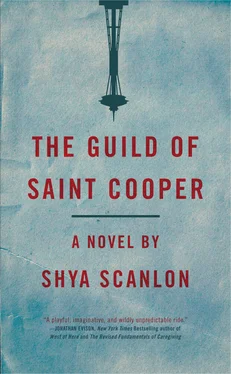The man who’d spoken was in late middle age, slight, and unshaven, his brown beard laced with silver hair. He was wearing an oxford shirt and crumpled tie. He was not threatening.
“No worries at all.” He smiled at me and took a step backward. “I’m Bertolt. Call me Bert.”
I got up and stood uneasily by an empty bookshelf. “Hello, Bert,” I said. “Blake.”
“Sorry to have startled you.”
“Sorry for the intrusion.”
“Nonsense! I’m happy for the company.”
I looked around, trying to avert my eyes from the fireplace. I felt it might be an embarrassing thing to acknowledge the burning of books.
“I’m not squatting,” Bert assured me.
“Okay.”
“This is actually my house. I’m a history professor at Seattle Pacific University. This is my house, and fifteen is the number of days since my family left. Seattle Pacific University has been relocated to I don’t know where. All the students: gone. You know what I think? I think they would have left independent of the evacuation. They would have left because that’s simply what people do. They seek freedom. They move forward. Away from history. How, I ask you, can one be a teacher with no students? They don’t mention that in the handbook.”
I nodded. “I’m sorry to hear about your family.”
“Who?”
“Your family?”
“Let me tell you a story.”
“Actually,” I said, “I’ve got to go meet someone, so…”
Bert considered this, running his fingers through his beard and slightly swaying as though keeping time.
“How about if I just give you the gist,” he said finally.
“An overview?”
“A moral.”
“Deal.”
“Okay, let’s see. It’s probably something like: illumination can lead to blindness.”
I squinted my eyes and cocked my chin, pretending to capture the full weight of his words.
“Well,” he said, “it’s more impressive if you go through all the particulars.”
I nodded, then hurried down the hall and out through the plastic in the kitchen. I crossed over to the house next door to Crystal’s, and looked back to see Bertolt peering through the window at me, staring out from the damaged container of his life. He waved.
Exoskeleton , I thought.
He hadn’t tried to stop me, or call out for me, or in any way interfere with my sudden departure, and though I was glad he hadn’t, it also seemed to amplify the sadness of his situation. The bald resignation of it. From my spot in the neighbor’s yard I had the same view Kent had grown to hate: downtown Seattle standing up smartly to the left, and on the right, the placid Puget Sound patrolled by a lone police boat puttering slowly past the once-busy piers. The windows of Kent’s house facing me were to the foyer, the dining room, the kitchen, and the family room, and at first I didn’t see any movement.
I thought about Bertolt’s small, lonely wave. I’d once been to see a performance of Bertolt Brecht’s Threepenny Opera , and in it actors marched across the stage between scenes with large signs indicating the play’s themes and plot points. Brecht had insisted on producing “epic” rather than “dramatic” theater. He wanted to highlight the artifice. He wanted to fight the suspension of disbelief. Standing there behind a hedge, I imagined Crystal popping up into a window, holding a card. What would it have said?
When she did appear, she was holding a plate. She’d apparently been in the kitchen the whole time, hidden between two windows, and she walked from the kitchen into the dining room, put the plate on the table, and called Olivia, who came to the table and sat with her back to me. Crystal walked back to the kitchen and I cautiously moved to stand directly under the window.
“Do you want some milk, Olly?”
“Yes, please.”
“Another pancake?”
“No, thank you.”
They didn’t speak much, giving away nothing of their reason for visiting the house, and after eating they went out front. I slunk toward the back of the house, thinking I’d just hide until they left, but they didn’t leave. They brought out a bucket and some soap and pulled a hose out to the car. I stayed another two hours. After washing the car, they spent some time on the back porch, then went into the family room, where, from what I could tell, they played a board game. I finally left on account of the heat and my own hunger, and it wasn’t until I pulled up in front of my mother’s house again that I understood what they were doing.
My mother was in the front yard, and stood to greet me.
“Where’ve you been?” she said.
“Just driving around. Have you seen Kent?”
“He’s giving me gas.”
“Mom.”
“He’s around back.”
I looked at the work she’d done. The yard was almost entirely clear of weeds, and she’d moved some dirt into a small berm by the fence. “This is exciting.”
“There was a man here asking about you this morning.”
“What did he want?”
My mother frowned, shook her head. “Unclear. Information? He just asked where you were. He complimented my garden.”
“What was his name?”
“Oh, rats. I was afraid you’d ask that. Blake, sweetie, I didn’t ask. I’m sorry, but he threw me off somehow and I didn’t think of it until he’d left.”
“Well, what did he look like?”
“He was handsome, smartly dressed. Suit and tie, black.”
“God damn it,” I said.
“Not the man. The suit and tie were black. He was actually quite fair-skinned. He looked like a Mormon.”
I left my mother and headed down the driveway. She called after me, apologizing again for having not asked the man’s name. Blake was standing in a window as I passed, mouthing the words, “Where have you been?” I held up a finger and went out back, where I found Kent pouring the contents of a ten-gallon gas can into the unused oil reservoir that stood in a small shed at the southeast corner of the house.
“I know this looks dangerous,” he said, “and that’s because it is, kind of.”
“Do you know what your family has been doing every day?”
Kent stopped pouring and put the gas can down. “They’ve been going to my house.”
“And, uh, okay, so you know.”
I was in fact surprised that he knew. It didn’t seem to line up with the kind of pragmatism he championed. Then again, he might not approve.
“I suggested it,” he said.
Then again, he might have suggested it.
“Don’t you think it’s unhealthy?”
“I don’t know, Blake. What’s the appropriate response to this situation?”
“Point taken. But you know, it’s just—”
“We’re leaving, Blake.”
Along the fence beside the oil tank were vine roses my father had salvaged from a job site years ago and planted for my mother’s birthday. One had shot off the top of the fence and was reaching out, up, bending under its own weight, away from the house. I couldn’t look Kent in the eyes, so I turned and headed back the way I’d come.
“Blake,” he called after me. “Don’t say anything to Mom.”
The phone rang four times before Nancy picked up. I’d walked down to the corner for privacy and was sitting on the front steps of a house I hadn’t been to since childhood. A drunk driver had once jumped the curb and slammed into the living room in the middle of the night, and though the house had long since been repaired, evidence of the crash lingered in the form of a large, car-stopping cement pole topped by a spray of rusting rebar. I’d thought the project was unfinished until I realized that the whole world was.
“Sorry,” she said. “I was on another call.”
“Nancy, here’s the deal. I haven’t told my family about the book. I don’t want them freaking out and losing focus, because there’s a lot to do here, and they need to stay focused, okay?”
Читать дальше












